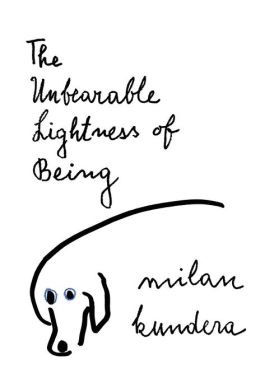by Milan Kundera
This was one of the latest love stories I read. I think I had love story fatigue, because I didn't get into the plot very much. I also found myself not particularly interested in the characters. I can't put my finger on what it was, but each one had some sort of pathetic fault to them that just made my eyes roll constantly.
Don't get me wrong, this was still a pretty good book, but no thanks to the love story. I really love hearing Kundera's voice at carefully placed spots throughout the book. He's a little bitter about the state of Eastern Europe in the 1980s, but his anger ignites his writing. There is one part of the book where he sounds a little like Rene Descartes. Deeper in the book there is a part about God and shit; it made the book for me. I won't ruin it for you.
Kundera's philosophy drenches some beautifully crafted pose. Here's a couple of my favorite passages, and, yeah, I realize there's a bunch of stuff about love:
We can never know what to want, because, living only one life, we can neither compare it with our previous lives nor perfect it in our lives to come....What happens but once, says the German adage, might as well not have happened at all. If we have only one life to live, we might as well not have lived at all. (p. 8)
Necessity knows no magic formulae-they are all left to chance. If a love is to be unforgettable, fortuities must immediately start fluttering down to it like birds to Francis of Assisi's shoulders. (p. 49)
Sensuality is the total mobilization of the senses: an individual observes his partner intently, straining to catch every sound. (p. 54)
No, vertigo is something other than the fear of falling. It is the voice of the emptiness below us which tempts and lures us, it is the desire to, against which, terrified, we defend ourselves. (p. 60)
We might also call vertigo the intoxication of the weak.(p.76 )
Culture is perishing in overproduction, in an avalanche of words, in the madness of quantity. (p. 103)
There are things that can be accomplished only by violence. Physical love is unthinkable without violence. (p. 111)
...love means renouncing strength. (p. 112)
Surgery takes the basic imperative of the medical profession to its outermost border, where a person is clubbed on the head, he collapses and stops breathing. Some day, he will stop breathing anyway. Murder simply hastens a bit what God will eventually see to His own. God, it may be assumed, took murder into account; He did not take surgery into account. He never suspected that someone would dare to stick his hand into the mechanism He invented, wrapped carefully in skin, and sealed away from human eyes. (p. 293)
I have said before that metaphors are dangerous. Love begins with a metaphor. Which is to say, love begins at the point when a woman enters enters her first word into our poetic memory. (p. 209)
The novel is not the author's confession; it is an investigation of human life in the trap the world has become. (p. 221)
History is as light as individual human life, unbearably light, light as a feather, as dust swirling into the air, as whatever will no longer exist tomorrow. (p. 223)
Love is the longing for the half of ourselves we have lost. (Plato's 'Symposium'). (p. 239)
(about vertigo) ...when the north pole comes so close as to touch the south pole, the earth disappears and man finds himself in a void that makes his head spin and beckons him to fall.
...
If rejection and privilege are one and the same, if there is no difference between the sublime and the paltry, if the Son of God can undergo judgement for shit, then human existence loses its dimensions and becomes unbearably light.(p. 244)
And therein lies the whole of man's plight. Human time does not turn in a circle; it runs ahead in a straight line. That is why man cannot be happy: happiness is the longing for repetition. (p. 298)

No comments:
Post a Comment